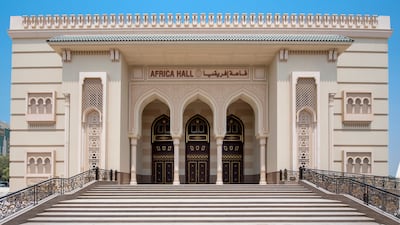Every March, artists and institutions flock to Sharjah to discuss and share ideas within the realm of contemporary art.
This year, the March Meeting is running parallel to the Sharjah Biennal, with the platform focusing on issues that revolve around the event's overarching theme, Thinking Historically in the Present.
Running until Sunday, the March Meeting is being held under the title The Postcolonial Constellation: Art, Culture, Politics after 1960. The theme takes its cue from late Nigerian art critic Okwui Enwezor’s conception of the Postcolonial Constellation exhibition. The programme of panels, talks and presentations is examining the systemic and structural shifts that have influenced the production and absorption of art worldwide since the mid-20th century.
Reflections of the postcolonial landscape have long been a concern for the annual event. The inaugural March Meeting took place in 2008 and revolved around predictions of what the future of the regional art scene would look like. It featured two dozen delegates from across the Arab world and was held in collaboration with the Sharjah Biennal, the Young Arab Theatre Fund and Art Dubai.
The second meeting took place on the sidelines of the ninth Sharjah Biennal. More than 40 institutions participated from the Arab world and beyond. Panellists discussed the production and reception of Arab art and how the global economic climate was affecting artists within the region. The March Meeting also featured a week-long intensive workshop for young curators.
The March Meeting steadily expanded over the next decade, incorporating new aspects, including Dardashat. an informal project discussion that showcases new cultural projects from around the world, and features a growing number of institutions, artists and art professionals.
Keynote speakers have included the likes of Moroccan author Abdelfattah Kilito; Enwezor; German art curator Beatrix Ruf; Lebanese founding director of Ashkal Alwan Christine Tohme; and Swiss art historian Hans Ulrich Obrist.
Now celebrating its 15th event, the March Meeting continues to be an important part of the UAE’s cultural calendar. The platform is vital in reconsidering traditional historical narratives and is at the cutting edge of global art discourse. Speakers this year include architect Nadi Abusaada, human rights and politics professor Mahvish Ahmad, anthropologist Kamran Ali and art historian Salwa Mikdadi.

